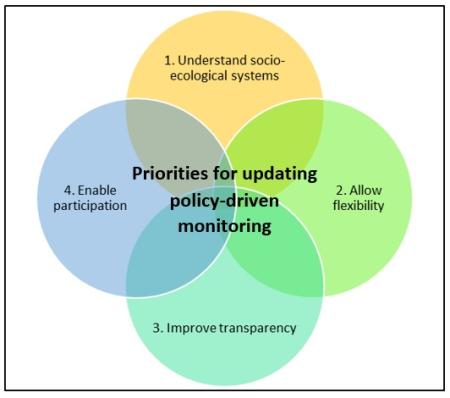
ESCom members Kerry Waylen and Kirsty Blackstock at the James Hutton Institute have just finished coordinating a pan-European initiative called ‘MEEM’ to understand how policies influence monitoring practices, and how well this accords with what is needed for adaptive management.
Monitoring & Evaluation (M&E) is an essential part of the process of ‘adaptive management’ - the process of learning from our actions in order to update and improve future ecosystem management. However, it is often thought that M&E is imperfect or inadequate, and thus hinders our abilities to improve ecosystem management. Across Europe there are a number of policies that are major influences on how we manage and monitor our ecosystems: we know that complying with the requirements of policy often ties up much resources and attention, but we don’t know much about the specific implications for M&E. Therefore we created MEEM to better understand how policies shape M&E practices, and the implications for ecosystem management.
We looked at the effects of 3 policies relevant across Europe: (1) the Natura 2000 Directives; (2) the Water Framework Directive; and (3) Agri-Environment Schemes under the Common Agricultural Policy. We first synthesised the current state of policy-driven monitoring & evaluation in 9 countries across Europe, and then compared these practices to the current recommendations in the literature. The countries that we studied correspond to the location of MEEM partners: more information about our partners is available via the map. The collaboration was funded by a 'High Impact Action' funded by ALTER-Net, a network who research biodiversity and ecosystem services.
The good news is that we found all three policy areas stipulate some form of M&E which helps us to understand about the state and trends of some aspects of the environment. Without the mandates and guidelines of these policies, perhaps we would not have this information. However, we found that these M&E programmes often fail to deliver the ‘ideal’ of what might be required to understand dynamic and multi-level socio-ecological systems. In particular, there can be a lack of attention to systems processes, and especially social aspects of socio-ecological systems (for example, human actions that affect the status of a protected area). This, together with limited attention to context (e.g. climate change impacts) and means that it can be hard to understand observed changes. We also felt that monitoring the effects of management actions received relatively little attention, which could obviously limit the ability to learn about the effects of those actions. We suspect that these issues may limit the use of monitoring information in decision-making: however, because there is a lack of transparency in how information are evaluated and used, we cannot know for sure.
As a result of this study we’ve made some recommendations to summarise the main ways to improve policy-driven monitoring. Implementing the recommendations will not always entail additional resources for M&E: the most important thing is to think afresh and consider what information is actually useful and useable for decision-makers such as groups managing protected sites.
For more information about our recommendations, click here for a 4-page briefing.
For more information about the MEEM project, visit the website https://www.hutton.ac.uk/meem